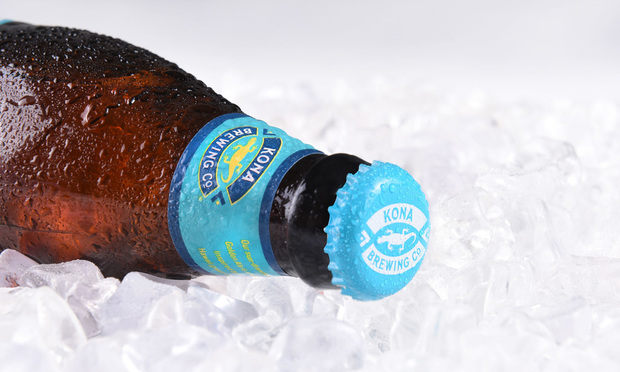Daily Dicta In Kona Beer Settlement, Prison Inmates Demand to Be Included in Class (Hey, It's a Free $10)
They way class actions involving low-cost consumer goods are handled makes no sense for anyone but plaintiffs lawyers. And possibly prison inmates.
October 26, 2019 at 05:44 PM
6 minute read
 Kona Brewing Company Big Wave Golden Ale.
Kona Brewing Company Big Wave Golden Ale.
I'm trying to imagine the conversation between Miguel Valenzuela—a.k.a. inmate number 2024530, doing time in Texas state prison in Hondo for forgery and fraud—and Frederick Furguson Jr.—fellow Hondo inmate 2136576, convicted of theft, possession of meth and an unlawful firearm.
"When I was on the outside, I enjoyed Kona Brewing Company beer. But then I discovered the craft brews that I thought were from Hawaii's Big Island were actually brewed in Oregon, Washington, New Hampshire or Tennessee. Now I feel cheated and deceived. If only there was a way for me to get justice."
"Yes, me too. I was sure the Longboard Island Lager, Hanalei IPA, Castaway IPA, Big Wave Golden Ale, Lemongrass Luau, Wailua Wheat, Fire Rock Pale Ale and Pipeline Porter I bought were from Hawaii—that's why I paid a premium to purchase them! Surely I'm owed compensation?"
Yep, I bet that's just how it went down.
 I actually have grudging respect for the pair. Both stand to get $10 deposited in their inmate trust funds for use at the prison commissary as potential members of the Kona beer class action settlement, which is awaiting final approval by U.S. District Judge Beth Labson Freeman in the Northern District of California. They've figured out how to exploit a ridiculous system.
I actually have grudging respect for the pair. Both stand to get $10 deposited in their inmate trust funds for use at the prison commissary as potential members of the Kona beer class action settlement, which is awaiting final approval by U.S. District Judge Beth Labson Freeman in the Northern District of California. They've figured out how to exploit a ridiculous system.
Class actions make sense to me—when there's a way to identify members who share a common injury. Maybe it's people who bought a particular car (cough VW) or stock in a particular company. Maybe it's people who made a purchase that involved registration or used a service where customer records exist.
But when the lawsuits revolve around a low-cost consumer item—something that's widely purchased and for which no normal person would save a receipt? And then these buyers are somehow supposed to be identified and motivated to submit a form in order to get a pocket-change refund?
It's a joke.
Which is not to say I think companies should get a free pass for cheating a large number of people out of small sums of money. But the way these cases are handled now makes no sense for anyone but plaintiffs lawyers. And possibly prison inmates.
The suit against Kona is a good example.
Kona has been making beer in Hawaii since 1994. In 2010, defendant Craft Brew Alliance Inc. bought the company and expanded its reach. Kona beer for sale in Hawaii is made in Hawaii, but on the mainland, it's not.
"Had plaintiffs and other consumers known that the Kona Brewing Co. Beers were not brewed in Hawaii, they would not have purchased the Kona Brewing Co. Beers or would have paid significantly less for them. As a result, plaintiffs and other consumers have been deceived and have suffered economic injury," states the 2017 complaint by Faruqi & Faruqi and The Wand Law Firm.
My bias is going to show here. Before I went to journalism school at U.C. Berkeley, I worked for a small beer company that "contract brewed" its beer—that is, it had an adorable brewery in a scenic place, but also had a contractual arrangement with a much larger brewery to produce additional product.
Beer is…not that complicated. If you specify the recipe, a brewmaster can produce the same beer in another location. It's not like wine. No one can tell the difference (seriously, we tested). Which is another way of saying I think this suit is garbage.
But that didn't stop Judge Freeman in September of 2018 from certifying the class. "Poi, spam musubi, pineapple. These are just a few of the foods that make most people think of Hawaii. But what about Kona beer? That's one question Plaintiffs Simone Zimmer and Theodore Broomfield ("Plaintiffs") hope to answer here by means of this class action lawsuit," she wrote.
Kona specifies on the labels of its bottles and cans that its beer is brewed in "KONA HI • PORTLAND, OR • WOODINVILLE, WA • PORTSMOUTH, NH • MEMPHIS, TN." Surely that's a clear disclosure?
"This is another lawyer-driven, no-injury, copycat lawsuit," protested Kona counsel Tammy Webb of Shook Hardy & Bacon.
The plaintiffs countered that Kona's outer packaging such as six-pack carriers and 12-pack boxes, which include a map pinpointing Kona's Big Island brewery, didn't alert consumers that the beer might not have actually come from Hawaii.
Freeman agreed, writing that "Reasonable consumers are not expected to remove outer packaging to see labels obscured by that packaging."
Kona opted to settle. I don't really blame them—the publicity alone was probably not worth the fight. The deal calls for people who purchased the beer between February 28, 2013 and June 14, 2019 but have with no proof of purchase to get up to $10 and those with receipts to get up to $20.
Kona parent company Craft Brew Alliance also agreed to pay the plaintiffs lawyers $2.9 million in fees and costs, taking a $4.7 million pretax charge for the expected overall cost, according to Reuters.
The price tag makes clear they didn't expect a flood of refund requests. To notify potential class members, plaintiffs lawyers made a website (konabeersettlement.com), put out a press release, ran some (unspecified) internet banner ads, and placed a single ad in one print issue of National Geographic magazine plus four ads in the print edition of the San Jose Mercury News. Not what I'd call overwhelmingly robust outreach.
But somehow Valenzuela and Furguson got wind of the settlement (maybe in National Geographic? That seems like the kind of publication that would be available in a prison library.)
Both submitted hand-written letters asking to be added to the class. "I purchased Kona Beer multiple times between February 28, 2013 and June 14, 2019 that was portrayed to be brewed in Hawaii when it was not" wrote Furguson, who has been behind bars since May 30, 2017. "I am really offended by Craftbrew Alliance Inc. actions. Please send me a claim form."
Similarly, Valenzuela (who has been in prison since August of 2015) wrote that he'd made multiple purchases of the beer "that was portrayed to be brewed in Hawaii when it was actually not. I am confused why Craftbrew Alliance would do this. I have no receipts due to the amount of time that has passed since my last purchase."
The plaintiffs lawyers did check to make sure that the inmates weren't incarcerated during the entire class period.
Beyond that, there's no way to prove they didn't buy the beer, so hey, enjoy the $10 windfall.
This content has been archived. It is available through our partners, LexisNexis® and Bloomberg Law.
To view this content, please continue to their sites.
Not a Lexis Subscriber?
Subscribe Now
Not a Bloomberg Law Subscriber?
Subscribe Now
NOT FOR REPRINT
© 2025 ALM Global, LLC, All Rights Reserved. Request academic re-use from www.copyright.com. All other uses, submit a request to [email protected]. For more information visit Asset & Logo Licensing.
You Might Like
View All
Litigators of the Week: After Two Big Wins for Plaintiffs, a Defense Verdict for Infant Formula Makers

Litigators of the Week: King & Spalding Gets 2nd Circuit to Uphold 'All Natural' Win For Kind Bar Maker

How Overseeing Legal Operations Has Affected How Steve Mahieu of Kraft Heinz Looks at Litigation

Litigators of the Week: Proskauer Scores a Defense Win for Last Defendant Standing in Broiler Chicken Antitrust Suit
Trending Stories
- 1South Florida Attorney Charged With Aggravated Battery After Incident in Prime Rib Line
- 2'A Death Sentence for TikTok'?: Litigators and Experts Weigh Impact of Potential Ban on Creators and Data Privacy
- 3Bribery Case Against Former Lt. Gov. Brian Benjamin Is Dropped
- 4‘Extremely Disturbing’: AI Firms Face Class Action by ‘Taskers’ Exposed to Traumatic Content
- 5State Appeals Court Revives BraunHagey Lawsuit Alleging $4.2M Unlawful Wire to China
Who Got The Work
J. Brugh Lower of Gibbons has entered an appearance for industrial equipment supplier Devco Corporation in a pending trademark infringement lawsuit. The suit, accusing the defendant of selling knock-off Graco products, was filed Dec. 18 in New Jersey District Court by Rivkin Radler on behalf of Graco Inc. and Graco Minnesota. The case, assigned to U.S. District Judge Zahid N. Quraishi, is 3:24-cv-11294, Graco Inc. et al v. Devco Corporation.
Who Got The Work
Rebecca Maller-Stein and Kent A. Yalowitz of Arnold & Porter Kaye Scholer have entered their appearances for Hanaco Venture Capital and its executives, Lior Prosor and David Frankel, in a pending securities lawsuit. The action, filed on Dec. 24 in New York Southern District Court by Zell, Aron & Co. on behalf of Goldeneye Advisors, accuses the defendants of negligently and fraudulently managing the plaintiff's $1 million investment. The case, assigned to U.S. District Judge Vernon S. Broderick, is 1:24-cv-09918, Goldeneye Advisors, LLC v. Hanaco Venture Capital, Ltd. et al.
Who Got The Work
Attorneys from A&O Shearman has stepped in as defense counsel for Toronto-Dominion Bank and other defendants in a pending securities class action. The suit, filed Dec. 11 in New York Southern District Court by Bleichmar Fonti & Auld, accuses the defendants of concealing the bank's 'pervasive' deficiencies in regards to its compliance with the Bank Secrecy Act and the quality of its anti-money laundering controls. The case, assigned to U.S. District Judge Arun Subramanian, is 1:24-cv-09445, Gonzalez v. The Toronto-Dominion Bank et al.
Who Got The Work
Crown Castle International, a Pennsylvania company providing shared communications infrastructure, has turned to Luke D. Wolf of Gordon Rees Scully Mansukhani to fend off a pending breach-of-contract lawsuit. The court action, filed Nov. 25 in Michigan Eastern District Court by Hooper Hathaway PC on behalf of The Town Residences LLC, accuses Crown Castle of failing to transfer approximately $30,000 in utility payments from T-Mobile in breach of a roof-top lease and assignment agreement. The case, assigned to U.S. District Judge Susan K. Declercq, is 2:24-cv-13131, The Town Residences LLC v. T-Mobile US, Inc. et al.
Who Got The Work
Wilfred P. Coronato and Daniel M. Schwartz of McCarter & English have stepped in as defense counsel to Electrolux Home Products Inc. in a pending product liability lawsuit. The court action, filed Nov. 26 in New York Eastern District Court by Poulos Lopiccolo PC and Nagel Rice LLP on behalf of David Stern, alleges that the defendant's refrigerators’ drawers and shelving repeatedly break and fall apart within months after purchase. The case, assigned to U.S. District Judge Joan M. Azrack, is 2:24-cv-08204, Stern v. Electrolux Home Products, Inc.
Featured Firms
Law Offices of Gary Martin Hays & Associates, P.C.
(470) 294-1674
Law Offices of Mark E. Salomone
(857) 444-6468
Smith & Hassler
(713) 739-1250






